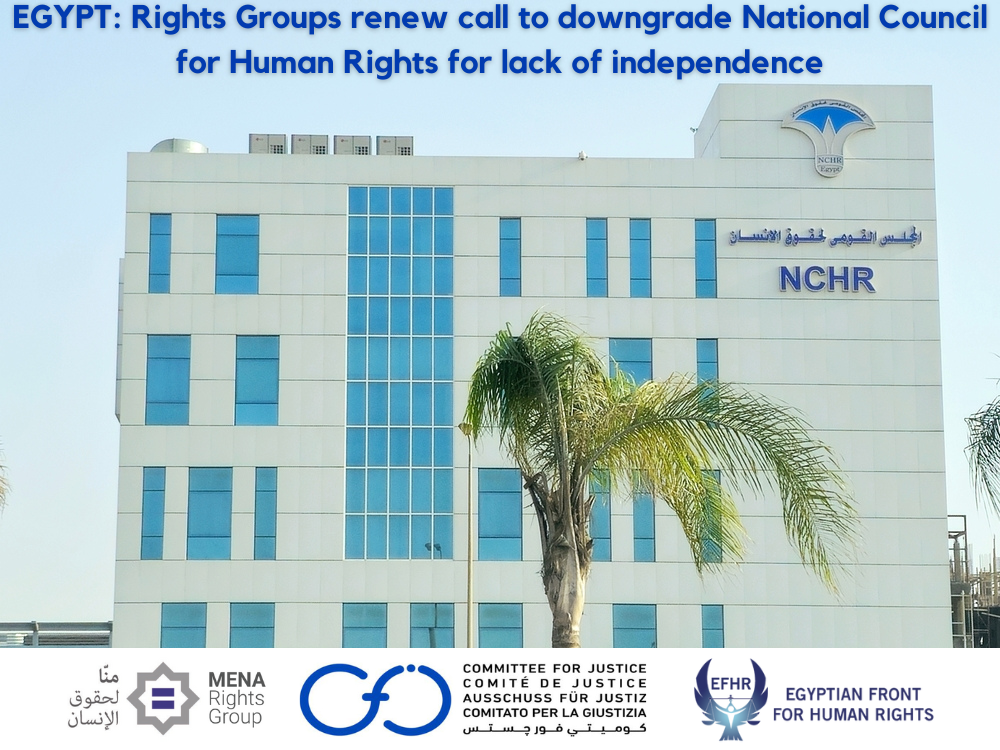July 11, 2024
The Committee for Justice (CFJ), MENA Rights Group, and the Egyptian Front for Human Rights (EFHR) submitted an evaluation report to the Sub-Committee on Accreditation (SCA) of the Global Alliance of National Human Rights Institutions (NHRIs) challenging the Egyptian National Council for Human Rights’ (NCHR) efforts to keep its A status. The SCA had given the NCHR 12 months to remedy a number of shortcoming highlighted during the session of September and October 2023.
In their contribution, the three NGOs have submitted an assessment report containing follow-up information that may assist in evaluating the extent of the NCHR's compliance with the Paris Principles.
Over the past two years, the Egyptian government has attempted to whitewash its human rights record by portraying itself as open to political dialogue with the opposition. This is particularly evident in the launch of the national dialogue in 2022 and the declaration of 2022 as the "Year of Civil Society." Despite all this, the recent presidential elections held in Egypt from December 10 to 12, 2023, which saw President Abdel Fattah el-Sisi appointed for a third term, paved the way for an unprecedented crackdown on the Egyptian people and civic space.
Most notably, in May 2023, Egyptian security forces arrested two students from Mansoura University after they expressed pro-Palestinian views on campus. Similarly, on November 30, four international activists were arrested and held incommunicado for more than 27 hours following a pro-Palestinian protest outside the Ministry of Foreign Affairs in Cairo. In October 2023, Egyptian security forces arbitrarily arrested, detained, and prosecuted dozens of peaceful protesters and activists in Cairo and Alexandria who had gathered to peacefully demonstrate in solidarity with Palestine and demand the protection of civilians in Gaza. Between October 20 and 24, at least 72 peaceful protesters were arrested by security forces following pro-Palestinian demonstrations.
The NCHR has failed to act to prevent these flagrant human rights violations or hold the Egyptian authorities accountable, raising serious questions about its ability to function as an independent and impartial human rights body. This is due to governmental control over the Council, rendering it a "quasi-governmental council," and thus an institution that does not meet the requirements of independence and effectiveness set forth in the Paris Principles. Despite the SCA encouraging the Council to enhance its efforts to address all human rights violations, hundreds of complaints submitted to the NCHR, including cases of enforced disappearance and arbitrary detention, continue to be ignored. This leads to the conclusion that the NCHR is not an effective mechanism for holding the state accountable or providing redress to victims of human rights violations.
Regarding visits to places of deprivation of liberty, the joint assessment report conveyed the observations of the UN Committee Against Torture (UNCAT) in its 2023 Concluding Observations Egypt's fifth periodic report, which highlighted numerous shortcomings in the NCHR's monitoring of detention centres. There is also concern about the lack of information on any unannounced visits to places of deprivation of liberty by independent mechanisms. As the council's mandate does not allow for unannounced visits to places of deprivation of liberty, its visits are allegedly prearranged and do not permit unrestricted access or confidential interviews with detainees. The UNCAT urged the Egyptian government to ensure that monitoring bodies tasked with visiting places of deprivation of liberty, including the NCHR, can conduct regular, independent, and unannounced visits to all civilian and military places and speak confidentially with all detainees.
Concerning the NCHR administrative independence, the joint assessment report tried to provide a realistic picture of the NCHR's leadership, where concerns about its independence are exacerbated by its leadership composition. Both the president and vice president of the NCHR, appointed in 2021 for four years, are former Egyptian officials. The vice president, Mahmoud Karem, also served as the campaign coordinator for President Sisi's presidential campaign. Therefore, the council's composition itself represents a clear violation of the Paris Principles' fundamental requirement that "the national human rights institution is, and is perceived to be, able to operate independently of government interference." In its latest review of the council and its work, the SCA demanded to "ensure the formalization of a clear, transparent, and participatory selection and appointment process for the decision-making body of national human rights institutions in the relevant legislation, regulations, or binding administrative guidelines, as appropriate," which has not been implemented in reality.
The NCHR also fails to adequately represent or engage with civil society and thus does not meet the principle of pluralism. On December 29, 2021, President Sisi issued Decree No. 616 of 2021, reconstituting the NCHR for four years. Ambassador Mushira Mahmoud Khattab was nominated as the council's president, and Ambassador Mahmoud Karem Mahmoud as vice president. Civil society did not participate in the nomination process. Despite the factual evidence of the lack of representation of civil society, the council still claims in its annual report that "the council enjoys diverse and rich representation of civil society, with nearly half of its members coming from civil society organizations," which is a "showy rhetoric" that contradicts the reality of the institution's composition.
Regarding the financial independence of the council, the joint assessment report noted with concern the continued lack of financial independence of the NCHR vis-à-vis the executive authority. While Article 1 of Law No. 197 of 2017, amending the provisions of Law No. 94 of 2003, states that the council "enjoys technical, financial, and administrative independence in exercising its tasks, activities, and competencies," the National Council for Human Rights remains state-funded. In reality, the council's law still requires the House of Representatives' approval for any grants and donations received from foreign entities, which contradicts the requirements for national human rights institutions, stating that "they should not be required to obtain state approval for external funding sources, as this requirement may undermine their independence."
Regarding the issuance of annual reports, the organizations preparing the joint assessment report regretted the absence of any analysis of human rights violations, critical statements, or advocacy for respecting, protecting, and promoting Egypt's human rights commitments in the council's reports. These alleged improvements starkly contrast with the concluding observations of the Human Rights Committee issued in April 2023, as well as observations from civil society organizations.
For all the above reasons, the three rights groups affirm that the national human rights institution in Egypt does not meet the minimum standards outlined in the Paris Principles. CFJ, MENA Rights Group and EFHR have reasonable grounds to state that the NCHR does not fulfill the necessary requirements to be granted "A" status. Therefore, the SCA should consider downgrading the NCHR to "B" status until the institution can credibly and effectively address its significant shortcomings.







